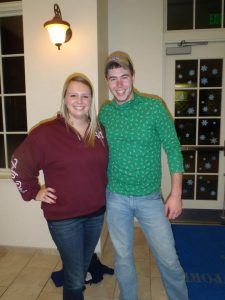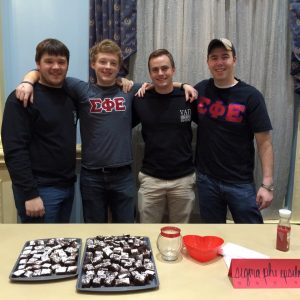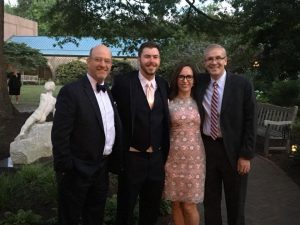“I think I want to look into transferring somewhere else.” Half-way through my first semester of college, this is what I told my parents because I felt unfulfilled by how my semester was going. While I had made friends with people in my dorm and was on the competitive bass fishing team (yes, this is a real thing), I was still feeling disconnected. My classes were going okay (although my first midterm taught me it might be helpful to fully do the readings), but I was not feeling fulfilled academically. Additionally, it felt like people either went home on the weekends or partied, both of which were not what I had expected or wanted out of my “college experience.”
Fast forward three and a half years later and I was in the final months of undergrad, not wanting it to end. Additionally, I had recently accepted a job offer to stay at my alma mater and work in our Center for Academic Success. How did I go from being so convinced that I wanted to leave the university to not being able to imagine a better place to spend four years of my life, even choosing to stay one more? The answer, in many ways, is a simple one: other people. But unpacking what “other people” means leads to a story of finding a community, engaging with professors who eventually became friends, and making connections with others and resources on campus.
So, let’s return to the end of my first semester of college when I began to find my community. It started with early morning talks with this  woman that sat behind the front desk of my residence hall. We chatted about classes, what she wanted to do in life, and her experience in Greek life at the university. As our friendship developed, I began to meet other people in Greek life who I really connected with over interests in history, politics, and education. Through these connections, I became interested in exploring Greek life, and when I returned from winter break, I decided to rush a fraternity. In the fraternity that I joined, I found a diverse group of individuals who shared a common interest in being excellent students, improving themselves, and investing in others.
woman that sat behind the front desk of my residence hall. We chatted about classes, what she wanted to do in life, and her experience in Greek life at the university. As our friendship developed, I began to meet other people in Greek life who I really connected with over interests in history, politics, and education. Through these connections, I became interested in exploring Greek life, and when I returned from winter break, I decided to rush a fraternity. In the fraternity that I joined, I found a diverse group of individuals who shared a common interest in being excellent students, improving themselves, and investing in others.  Ultimately, my fraternity provided me community that was not always perfect, but it was one that gave me many of my best friends in college, including the officiant and four groomsmen for my wedding to that woman I met at the front desk of my residence hall. This community started making the university I was at feel like home.
Ultimately, my fraternity provided me community that was not always perfect, but it was one that gave me many of my best friends in college, including the officiant and four groomsmen for my wedding to that woman I met at the front desk of my residence hall. This community started making the university I was at feel like home.
I also began to cultivate meaningful relationships with my professors which led to some of the most impactful opportunities and experiences I had during college. By visiting professors’ office hours to talk to them about topics from class as well as their interests outside of academics like sports and comics, I began to get to know professors on a deeper level. Three professors in particular—Drs. Brian and Laura Puaca and Dr. Andrew Falk—were extremely instrumental in my academic career. With their help, I was able to get involved in independent undergraduate research focusing on a World War II–era black community in Newport News, VA, as well as win research grants to complete archival research and oral history projects. As I started to think about wanting to possibly go to grad school to study history, I had countless conversations with them about what grad school was like, ways to strengthen my application, and how to evaluate different programs. During my senior year, when I felt completely overwhelmed with completing an independent research project, writing a senior thesis, working a part-time job, studying for the GRE, applying to grad schools, and trying to enjoy my final year, as I sat crying in their offices, they let me know that I could take a year off and would be an even stronger applicant for grad school. Additionally, they encouraged me to apply for a year-long fellowship to work at my alma mater which ultimately was the experience that led me into  the world of student success. Beyond being important mentors, Brian, Laura, and Andrew became friends who invited me over for dinners, celebrated my acceptance to my top choice grad school on Taco Tuesday at our favorite brewery, attended my wedding, and whom I look forward to catching up with when our schedules allow. Cultivating these relationships with faculty not only opened doors to academic experiences I never thought were possible, but also allowed me to feel a deeper connection to the work I was doing in the classroom, helping me feel fulfilled academically and personally.
the world of student success. Beyond being important mentors, Brian, Laura, and Andrew became friends who invited me over for dinners, celebrated my acceptance to my top choice grad school on Taco Tuesday at our favorite brewery, attended my wedding, and whom I look forward to catching up with when our schedules allow. Cultivating these relationships with faculty not only opened doors to academic experiences I never thought were possible, but also allowed me to feel a deeper connection to the work I was doing in the classroom, helping me feel fulfilled academically and personally.
Finally, my alma mater became the home I love and cherish today through the friendships and connections with other people at the university. For example, during college I worked the front desk of one of the freshman residence halls and became friends with Randy, the lead from facilities. Connecting over fishing, football, and stories of knucklehead students, Randy’s visits by the front desk made my day. Ms. Virginia, campus legend and cook at the dining hall, made my day as well whenever I went to get an omelet for breakfast; she would have my order ready before I even got to tell her what I wanted. And when I started to experience anxiety for the first time, my counselor from the University Counseling Center gave me strategies to cope and introduced me to mindfulness, which is something I value and work to implement in my life to this day. These relationships with staff at the university made me feel truly cared for and that if I ever needed anything, someone would be there to help. Really, the people I met turned my University into my “home.”
So sure, I worked hard, put my nose to the grindstone, and studied countless hours in the library to get through college, but really, I would not have made it through as successfully or with as much joy as I did without the countless number of people who were a part of my journey.


Leave a Reply